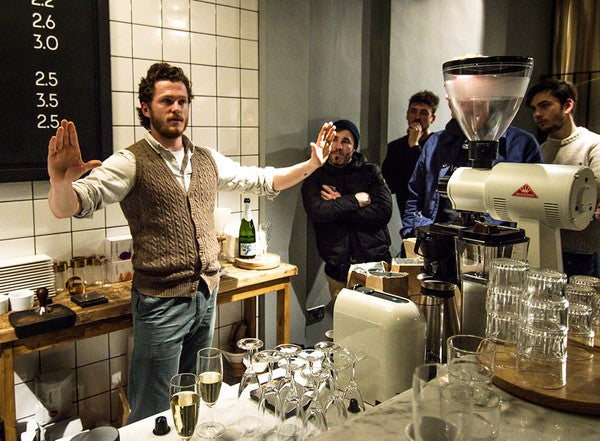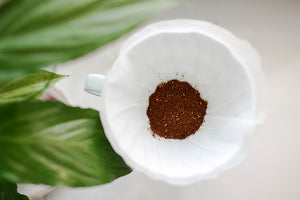
Maxwell Colonna-Dashwood on Speciality Coffee Pods
Coffee pods? What could that possibly have to do with speciality coffee? Surely it would be counterintuitive to even think of combining the two? Maxwell Colonna-Dashwood of Colonna Coffee thinks not and when he came to London to talk pods (or coffee capsules) at Modern Society in Redchurch Street, we sent Toby Henderson and Dominique Lim to find out just what Maxwell was playing at. We are grateful to Assembly Coffee and Modern Society for the invitation. Toby’s thoughts are below...
After reading James Hoffman’s blog post last year on the decomposition of a capsule, trying to work out how they deliver the coffee drink they do for the amount ground coffee they use had quite a few people stumped. The capsule machines are quite clever. When I heard that Maxwell was looking at doing capsules, I was intrigued; I could see there was a place for convenient speciality coffee especially in the office, hotel and restaurant environment where Nespresso machines are commonplace.
Is Maxwell going after the Nespresso market? No. This, to him, is just another brewing method: it won’t replace brew bars, batch brewing or espresso machines. As Maxwell explained it, filter coffee is at one end of the strength scale while espresso is at the other. Capsule coffee, as he sees it, falls in between the two in terms of strength and texture. The capsule coffee I tried called to mind the coffee shots I tried at Bulldog Edition in Shoreditch.
So what was the main motivation behind Maxwell’s drive to look at capsules?
First off, control, namely, the ability to control the consumer’s drinking experience. Coffee-making can be and frequently is frustrating, with so many different variables having a significant impact on how the coffee comes out. Capsule coffee can get around this problem if done properly. The manufacturer can grind coffee beans when they are at their very freshest, and, by sealing them in an air-tight capsule, ensure the freshness of the coffee for a far longer time. This also tackles the issue of the appropriate grind size. The only thing left to chance now is water, which, as many will know, Maxwell has written the book on.
Second, the ability to appreciate coffee’s provenance. Capsules gives people the ability to taste and enjoy different coffees side-by-side at home. Currently, the only ways for a consumer to do this would be to do so at a shop or by purchasing multiple bags of coffee, both of which are more expensive compared to capsules. The processing of brewing multiple cups is time-consuming. Add to that the expense of buying all the coffee and then having to use up all the opened coffee. It’s so much more reasonable to get four pods at 75p each, say, for Africans or South Americans or 95p each for Panama Geisha, brew them quickly and try them side by side for less than a flat white seems like a huge win to me. In addition, capsules are far more shippable compared to a bag of freshly-roasted coffee.
Maxwell was asked about the environmental impact of coffee capsules – the ‘elephant in the room’ particularly seeing as Hamburg had just announced a ban on the purchase and use of coffee capsules in government-run buildings across the city. After all, the capsule packaging, with their mix of aluminium and plastic, is difficult to recycle, not to mention that recycling of aluminium is very energy-intensive. The issue of how to separate the different components is something which Maxwell is still working on. On the positive side though, capsule machines, given their size, are use far less energy compared to larger machines designed for commercial and industrial use. Environmental impact does remain a major concern though.
What did I think? I liked it. Yes, it won't replace my regular flat white or the v60 I religiously make every weekday morning. I am more likely to have a few capsules lying around the office for when I would like a coffee but don't have time to pop out for one or when traveling as many hotel rooms now seem to have Nespresso machines. I could very well bring my home-brewing kit – and I have – but, let’s face it, it does take up a lot of space when you’re trying to travel light.
Photo by Luke Pochron



